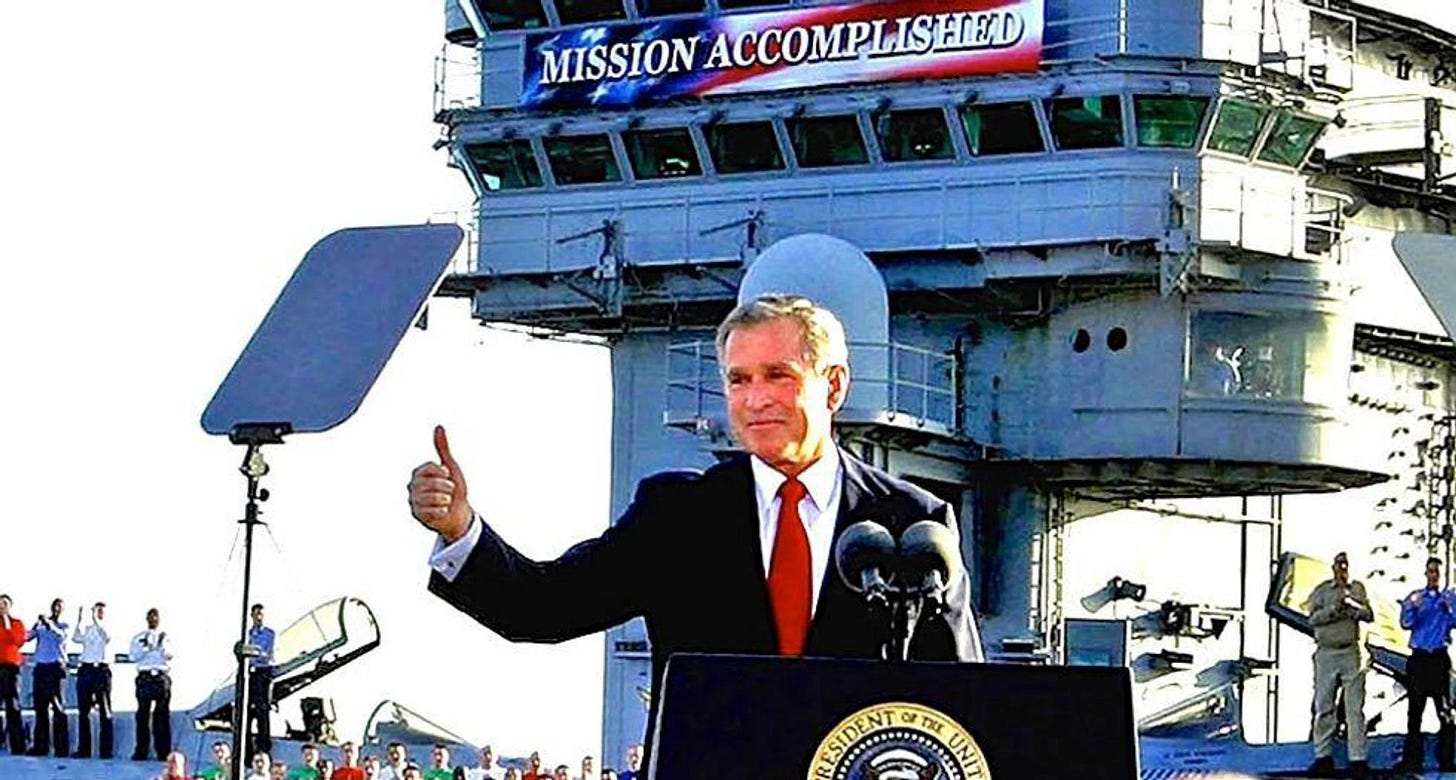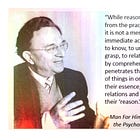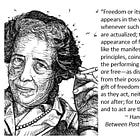The Invasion of Iraq, Twenty Two Years Later
The Perpetual Struggle for Peace and Human Dignity
On March 20, 2003, hours before daybreak, President and Commander in Chief George W. Bush launched a massive aerial assault on Iraq’s capital city, Baghdad. The Bush administration’s military aim was to “decapitate” Iraq’s leadership.
The “shock and awe” bombardment came to a grim and cacophonous crescendo on March 21. An IT News reporter in Iraq described it this way:
“Last night a square mile in central Baghdad seemed like hell on earth. An inferno…. This isn't just an attack on bricks and mortar. It is an assault on human senses.”

But the U.S. government’s cacophonous bombardment did much more than attack senses and destroy buildings. It precipitated the deaths of hundreds of thousands of Iraqis.
On this 22nd anniversary of the Iraq War, it’s important that we take an honest inventory of the bipartisan policy choices that led our nation to cause so much harm to the Iraqi people, at great economic expense of the United States, no less. Doing so gives us valuable context for the Trump administration’s endorsement of Israel’s renewed bombing of Gaza, including the express targeting of civilians, and ongoing threats against other nations including some long considered friends.
Bipartisan Embrace of War
Putting the Iraq War into perspective reminds us that President Trump’s foreign policy belligerence and willingness to sacrifice innocent life for political objectives is not a deviation but a continuation of mainstream American leadership.
President George W. Bush’s administration is rightly assigned responsibility for the Iraq War. President Bush issued the official order to invade Iraq. Vice President Dick Cheney repeatedly alleged Iraq possessed WMD and questioned analysts who argued otherwise. And Secretary of Defense Donald Rumsfeld led the military planning for the invasion of Iraq and downplayed the likely civilian casualties amidst his plans to use airstrikes in densely packed urban areas.
But too few acknowledge the bipartisan nature of the Iraq War. At the time, Senator Joe Biden was instrumental in aiding the Bush administration’s war effort. As I document in “Invading Iraq: A Bipartisan Tragedy,” Bidden used his position as Chair of the Senate Foreign Relations Committee to insist Iraq had weapons of mass destruction (WMD). Biden excluded the lead U.N. weapons inspector in Iraq from 1991 and 1998, Scott Ritter, from a 2002 hearing on Iraq. Biden began the hearing with a statement stating that Saddam Hussein had WMD and that either the weapons “must be dislodged from Saddam Hussein, or Saddam Hussein must be dislodged from power.”
As far back as 1998, Biden had insisted that Hussein would need to be taken “down” by men “in uniform” taking to the desert on “foot.” In other words, armed invasion. And when it came to the October 11, 2002 “Authorization for Use of Military Force Against Iraq,” Joe Biden was joined by Hillary Clinton, Dianne Feinstein, John Kerry, Chuck Schumer, and 48 Republicans to give the Bush administration congressional approval to proceed against Iraq unabated. Biden later co-sponsored the resolution commending Bush’s invasion, putting an exclamation mark on his support for the invasion.
The fact that 2024 Democratic presidential candidate, Kamala Harris would proudly and publicly thank Dick Cheney for his endorsement of her candidacy punctuated the bipartisan political consensus among elites in the United States. It also demonstrated a moral indifference to the hundreds of thousands of Iraqis who died as a direct consequence of Cheney’s decision making.
Disregarding Civilian Lives
Today, people of conscience are rightly gripped with moral concern for the U.S. and Israeli government’s disregard for civilian life exemplified in the leveling of the Gaza Strip. A recollection of the 2003 invasion of Iraq War reminds us that the disregard of civilian life has for too long been the rule rather than the exception.
President Biden’s administration actively armed and supported the Israeli bombardment of Gaza. About 70-percent of the 43,300 Palestinians killed, as of December 2024, were determined to be civilians. Researchers concluded that 44-percent were children. That means more than 30,000 non-combatants were killed through material support provided by the Biden administration in 14 months of war.
President Trump recently “greenlit” an Israeli assault that killed 436 Palestinians. The U.S. endorsed Israeli’s March 18, 2025 attack killed 183 children and 34 elderly people. Hundreds more were injured with many others buried under the rubble. The following day, Israel's Defense Minister, Israel Katz, invoked Donald Trump’s words to make an openly genocidal threat against the Palestinians:
“Residents of Gaza, this is your final warning…. What follows will be far harsher, and you will bear the full cost…. Take the advice of the U.S. President: return the hostages and kick out Hamas, and new options will open up for you—including relocation to other parts of the world for those who choose. The alternative is destruction and total devastation.”
Such threats are as morally bewildering as they are shocking. The existing civilian death toll is likely an undercount,1 according to researchers, leaving us only to cruel imaginings of the possibilities should such threats be acted upon.
The death and destruction foisted upon the people of Iraq by the U.S. government was no less devastating. Researchers with John Hopkins School of Public Health published a study in The Lancet concluding “as many as 654,965 more Iraqis may have died” from invasion related causes during the first 40 months of the war. The Iraq Family Health Survey Study Group reached a similar conclusion following its survey of more than 9,000 Iraqi households in 2006.
Researchers with Iraq Body Count determined that nearly 24,865 Iraqi civilians were killed in between March 2003 and March 2005. Another 42,500 civilians were injured during this time. U.S.-led forces are estimated to have been directly responsible for killing 9,000 of those 24,865 civilians, with airstrikes being the most common cause of death. Coalition forces are believed to have killed 6,616 Iraqi civilians in the first 21 days of the U.S. invasion. The U.S. was responsible for nearly 99% of the killings committed by the U.S.-led coalition.
I’ve made this premium lecture video available for everyone. I invite you to watch/listen and share with others.
Lecture: Lessons of the Iraq War
As long-time readers will know, Humanities in Revolt aims to bring the questions, ideas, expressions, and insights of the humanities out of the ivory tower and into the wider public domain. To this end, we make all essay posts available to all subscribers without a paywall. This is a commitment at the heart of our objective, fanning the flames of humanistic
The Perpetual Struggle for Human Values
A complete understanding of the Iraq War also means recognizing the many millions around the world who refused to imbibe political propaganda and morally callous calculations. On February 15, 2003, millions of opponents of the United States government’s looming invasion of Iraq marched through the streets of cities across the globe. It was the largest coordinated mass protest event in the history of the world. The worldwide peace protest was additionally historic in that it took place more than a month before the bombs began dropping and tanks began rolling through Baghdad.
Though the peace movement failed in its aim of saving the Iraqi people from the carnage and catastrophe of the 2003 U.S.-led invasion of Iraq, we ought not overlook, ignore, or dismiss the noble and just efforts of millions across the world working together to honor human dignity and advocate for nonviolent conflict resolution.
That the peace movement failed in its effort of averting the Iraq War is more an expression of the failing of our governmental institutions than the organizing efforts of the millions who passionately and rationally registered their dissent. A case can also be made that the peace movement succeeded in generating positive results, even as it failed in its primary aim of preventing the Iraq War. But this impact is not the most important and meaningful aspect of the peace movement.
The finiteness of existence and inevitability of defeat by the swinging pendulum of life presses us to anchor the meaningfulness of our lives and actions in something still deeper and weightier than utility. As I argued in “Embodying the Good,” we must anchor our meaning in the intrinsically good, ways of being that are good in-themselves. Where the peace movement was most accomplished was in exemplifying values and characteristics of being that were themselves good.
Dominant culture insists that the worth of our lives and actions is determined only in narrowly defined relation to “results” and “achievement.” Such a view of existence is rooted in a transitory, transactional worldview oblivious to the fact that nothing can be deemed useful or even successful less it is pinned to something valued for its own sake, what philosophers refer to as the “ends” of life and religious figures like Rev. Dr. Martin Luther King, Jr. called the spiritual “within” of life.
Against spoken and unspoken appeals to power, apathy, impotence, and fatalism, the millions who joined the movement against war exemplified quintessentially human values including truth, justice, autonomy, and integrity. These values are what psychologist Abraham Maslow named “B-values”: states of being that are intrinsically good, good-in-themselves, or ends unto themselves. These values, along with others like them, constitute the fundamental worldview through which meaning is determined.
Peace activists refused to abide by the inane, inhumane dictates of paternalistic power. They refused to be silent, passive, or complicit. Instead of being bystanders, activists chose to be agents, registering their dissent against war and allegiance to human dignity, justice, and reason. And these, my dear reader, are good ways to be. They are among the best characteristics of humanity. Whatever else they produce or inspire, whatever wins or losses they generate, we must refuse to accept the lie that their exemplification is not noble, beautiful, and good, in themselves.
In acting upon our commitment to truth, justice, civic freedom and autonomy, and integrity, we embody human values good in themselves. These are ideals which come into existence in the world, into being as virtues, only insofar as we embody and therefore enliven them.
Those of us who affirm growth, courage, humanity, love, knowledge, justice, and integrity as values and experiences that animate and give meaning to human existence are not dissuaded from honoring and exemplifying them simply because they cannot be predictably or permanently achieved. The humanities have and continue to help us come to terms with fallibility, impermanence, and mortality.
As I argued in “Beyond Victory,” it’s a mistake to evaluate our social change efforts strictly on the basis of outcomes and “victory.” Even when achieved, victory is transitory and gives way to reversals and future failure. Had the Iraq War been prevented, in 2003, it might have been implemented in 2004. The larger point is the meaningfulness of human existence cannot be strictly conceived of as the production of a particular concrete outcome. No victory is permanent; therefore, no victory avoids eventual defeat.
These are ideas as applicable to the present moment in which peace activists find their clamors for peace ignored and peaceful and humane activists like Mahmoud Khalil are vilified and arrested by immigration authorities for activities alleged to be “adversarial” to U.S. foreign policy and national security interests.
Whatever the future holds this much is clear: a world where millions affirmed the dignity of all human beings and challenged those in power to prioritize innocent life over amoral geo-political calculations is better than a world where all fatalistically resign themselves to dehumanization, domination, and death.
Below are a list of articles featured in Humanities in Revolt exploring the Iraq War:
Media Omissions on the 20th Anniversary of the Iraq War
Finding Meaning in the Peace Movement's Failure to Avert War
Please share and like this post by clicking the heart icon.
Invite Dr. Nall to Speak
Dr. Nall delivers energetic live presentations and engaging workshops on the subjects featured in Humanities in Revolt. Those interested in booking a workshop or talk can get in touch through Facebook or by leaving a comment.
The existing death counts in Gaza are likely under-counted, according to researchers. A January 2025 Lancet study of civilian deaths in Israel’s war on Gaza concluded that the Palestinian Health Ministry likely undercounted deaths by 41 percent. Researchers from London School of Hygiene and Tropical Medicine, Yale University, and other institutions estimate that 64,260 Palestinians were killed by Israel's military campaign between October 2023 and the end of June 2024.




















Perhaps the greatest strategic and moral blunder in American history. Destroyed a country, for what?
And the parallel with Ukraine? When the US, raging about 9/11, attacked a country that had nothing to do with 9/11. Not a country with shared borders, history, ethnicity and language that appeared to be aligning with an enemy: NATO. Our attack, “shock and awe” a hubris that’d make Andrew Tate blush, was justified with fabricated evidence of WMD to cover the illegal regime change, a regime we had put in place, and probably, to secure an energy supply. This act makes Putin look childish. But, as with Gaza, the victims are and were “other” Islam and Arab. Where the Ukraine is white and Christian. And yes, it is a US habit of war, conquest and control wrapped in our gruesome swaddling of propaganda.